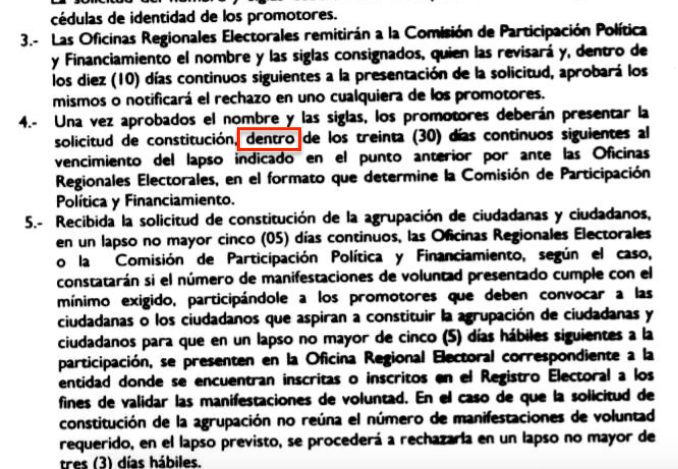The 1% Con
We found the secret resolution CNE used to argue we need 1% of the voters in each state to launch a recall. It just doesn't say that. And that's not the only regulatory detail they made up.


This week, opposition activists in Caracas took on the gargantuan task of organizing, indexing, scanning and collating the 2 million + signatures collected so far in the first step of the ridiculously cumbersome process to recall president Maduro. It’s a cumbersome process, made all the worst by CNE’s insistence that it’s not enough that the opposition collect 1% of the National voter roll to start the process, we need 1% of the voter roll in each state.
As you’ll recall, CNE claimed this requirement is contained in CNE Resolution #070906-2770. That’s a nine-year-old regulation contained in a Gaceta Electoral that, bizarrely, can only be consulted by personally going to the CNE offices in Plaza Caracas, because it isn’t available anywhere online.
Or, well, it wasn’t available, until a crack team of Caracas Chronicles operatives (thank you, A.E.!) finagled a copy and, well, here you have it:
(Resolution #070906-2770 starts on page 6 of the PDF)
Now why would CNE create weird, arbitrary barriers to accessing that specific regulation? Could it be because it plainly doesn’t say what they say it says about the 1% of signatures needed to launch the process?
Citizen groups may be formed equalling or exceeding one percent (1%) of the population registered in the Electoral Registry of the municipality, state, or the nation, depending on the case corresponding to the official whose mandate they seek to revoke. […]
The phrasing is a mess, of course, but the meaning of the regulation is clear enough. All elected officials are subject to recall. If you want to launch the process to recall a mayor or municipal councillor, you need to collect 1% of the signatures in the municipality where that specific official was elected. Which makes sense. If you want to revoke a state governor or state legislator, you need 1% of the voters in that state. That’s logical. And if you want to recall the president, you have to recall 1% of the national voter roll.
How you read that paragraph to mean we need to collect 1% of the vote in each of the component parts of a jurisdiction is simply seneseless and bizarre. And why stop at states? Why not 1% of each municipality? Of each parroquia? Of the catchment area for each voting center? Más bien se quedaron cortos.
We even asked a proper constitutional scholar, Dr. Carlos García Soto of Universidad Monteavila, to make sure we weren’t missing something. But the norm, again, is straightforward enough. In his words, “the interpretation CNE gave is fraudulent.” Plain and simple.
So, summing up: CNE made up a rule, then tried to hide it, then lied about what it said.
¡Lindo!
But it doesn’t stop there.
The next step of the process involves bringing the 1% of signatures to CNE within one month, so the verification process can begin. Except now CNE rectora roja-rojita extraordinaire Tania D’amelio says that even if the opposition is finished collecting its 198,000 signatures within 5 days of the process – hell, even if we’re finished collecting ten times that many – CNE won’t move forward with the procedure until the entire 30 day period for collecting them is elapsed.
Se debe cumplir el lapso de 30 días fijado para la recolección del 1% de manifestaciones de voluntad para pasar a la fase de constatación.
— Tania D´amelio (@taniadamelio) May 1, 2016
Justification? CNE Resolution #070906-2770, bien sûr.
Unlucky for her we have that resolution. And, again, it plainly doesn’t say what she says it says.
This is from Article 10. It says pretty clearly that the citizens asking for a recall have to present their paperwork within 30 days. That’s a ceiling, not a floor: it says dentro, verga, dentro. Not after 30 days or on the 30th day. Within thirty days.
But let’s say you’re tarado and you need someone to explain to you the interpretative principles you should rely on to settle any doubts that might arise about the interpretation of a norm. Well, in that case you could look Articles 2.b and 3 of the same damn resolution, which mandate that acts related to Recall Referenda must follow the principles of promptness (“Celeridad”), timeliness (“Oportunidad”) and efficiency (“Eficiencia”).
Once the request is received, CNE has five calendar days to move the process on. The way this thing is going, D’amelia will then try to tell us those are Venutian days, which last 5,832 hours each.
Not that any of it is news. They’re going to continue to dissemble and delay in the hopes of putting this off until next year. The reality is, nothing’s going to move on this process without people on the street. We always knew that.
Caracas Chronicles is 100% reader-supported.
We’ve been able to hang on for 22 years in one of the craziest media landscapes in the world. We’ve seen different media outlets in Venezuela (and abroad) closing shop, something we’re looking to avoid at all costs. Your collaboration goes a long way in helping us weather the storm.
Donate






